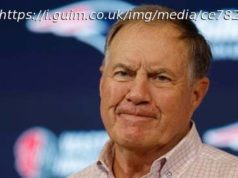From making too few putts to not playing European venues often enough, there are a clutch of theories to explain Team USA’s Ryder Cup travel sickness.
PARIS — The first time Jim Mackay went to the Ryder Cup is the last time the United States won it overseas. Phil Mickelson wasn’t even playing in the event. Raymond Floyd, now 76, was one of the U. S. stars. The Americans flew to England on the Concorde.
You can pick all manner of milestones to mark just how long it has been since the U. S. won a Ryder Cup on European soil. For example, Tiger Woods had just won his third straight U. S. Junior Amateur title; Rory McIlroy was swinging a plastic club in his parents’ living room at age 4, and Jon Rahm wasn’t even born.
All you need to know about the 2018 edition of the Ryder Cup as we get set for the biennial event, held this year at Le Golf National in Paris, France.
The Ryder Cup tests players in a way that a regular tour stop — or even a major — does not. So who is ready for the challenge? Who isn’t? We look at both rosters and size them up.
Tiger is hot. But should the U. S. be cautious with him or go all-out? Who could shine (or falter) for Europe? And most importantly, which side wins?
In 1993, Mackay, who would caddie for Mickelson for the better part of 25 years, ventured to England on his own dime for the Ryder Cup. His buddy, caddie Joe LaCava, was working for Fred Couples and invited Mackay, known as «Bones,» to sleep on his floor.
«Jim figured Phil was going to be playing in a lot of Ryder Cups,» said LaCava, who now caddies for Tiger Woods. «He was preparing.»
Mickelson hasn’t missed a U. S. team competition since, playing in every Presidents Cup and Ryder Cup over the ensuing 25 years. But he’s never won a Ryder Cup in Europe, a frustrating string of five consecutive losses that started in Spain in 1997, continued in England in 2002, Ireland in 2006, Wales in 2010 and Scotland in 2014.
Davis Love III, who was a rookie on that Ryder Cup team and scored the winning point in a 15-13 victory at The Belfry, has no answers as to why there has been such a drought.
«Raymond and Corey [Pavin] were some tough competitors on our team,» said Love, who has twice captained the U. S. and is a vice captain to Jim Furyk this year. «It was a really strong team, Tom’s [Watson] first time being captain. And we were all in awe of Tom Watson. It was bigger than life. The Concorde.
«The Ryder Cup was a little bit different then. We didn’t know the other side that well. And especially for a guy like me to go up against someone like Seve [Ballesteros]. It’s hard to imagine it has been that long [since the U. S. won in Europe].»
But how did it ever get this bad?
«I’m surprised we don’t win every single Ryder Cup, to tell you the truth,» said Mark Calcavecchia, who played in four but won only once. «But it’s hard now. We had it going for a while, but I really think it’s as simple as coming down to putts, who makes more. That’s being confident and relaxed and not uptight. They [the Europeans] figure out a way to do that.
«All that B. S. about we weren’t friends among our team is a bunch of crap. It’s three days of golf every two years. Anything can happen. Anybody can win. All those years I was pretty sure we had the strongest team, but their team is really good and just tough to beat over there.»
Why? There are theories galore, some of which are as simple as the strength of European golf. It might just be that in many of these instances, the Europeans were better, regardless of what any form sheets might say.
The 1997 European team featured the likes of Nick Faldo, Bernhard Langer, Jose Maria Olazabal, Lee Westwood and Colin Montgomerie — some of the best players in Ryder Cup history.
The 2002 team had Montgomerie, Langer, Padraig Harrington, Sergio Garcia, Westwood and Darren Clarke .
The point is that Europe has been good, too.
Still, the U. S. has had its share of stars over that time, including Woods, Mickelson, Jim Furyk, Love and several others.
1997: Europe 14½-13½ USA
You can pin this one on U. S. stars Tiger Woods, Justin Leonard and Davis Love III. The trio had each won a major but combined to go 1-9-3 in Spain.
2002: Europe 15½-12½ USA
Tied at 8-all going into Sunday at The Belfry, the U. S. suffered three early blowout losses in singles, and then Phil Mickelson could not dispatch lightly-regarded Phillip Price of Wales, losing 3&2. The Americans won just two singles matches outright.
2006: Europe 18½-9½ USA
Following the worst loss ever at home, the Americans lost by the same score in Ireland, never seemingly in the contest. Europe won every session. Scott Verplank went undefeated (2-0-0) but played just two matches.
2010: Europe 14½-13½ USA
Poor weather marred the event at Celtic Manor, pushing it to a Monday finish and only four sessions. The Americans won three of the four, but were unable to overcome a 3-point deficit on Monday despite a furious rally.
2014: Europe 16½-11½ USA
The Americans fell behind on Day 1 and trailed 10-6 going into singles. The event may have been a turning point for the U. S., as Phil Mickelson controversially led a push to make changes to how the Americans approach the Ryder Cup.
«It happens to be a razor-thin line between winning and losing Ryder Cups and when they are at home they slide themselves over that winning line,» said Paul Azinger, who played on the last victorious U. S. road team at The Belfry in 1993. «They take advantage of the home field. They can somehow read into how they can neutralize our strengths as a 12-man team. Even back then, they narrowed fairways. And they go to courses they play all the time. I think that helps them.
«Now there’s no excuse for America not to have won over there. I don’t believe anyone is intimidated or anything like that. In some cases, they were better than us. But I never felt like being in Europe was any different. Either your game travels or it doesn’t travel. The crowd cheering when you miss putts? It’s something you embrace, maybe put a chip on your shoulder in some way. I didn’t think it was any harder.»
The home team is able to set up the course as it chooses, and the Americans took full advantage of that two years ago at Hazeltine, where generous fairways and fairly accessible pins meant a lot of birdies. The idea was to let the long-hitting Americans have some room, and get the crowd into it with good shots and scoring.
Of course, there was nothing to say the Europeans could not have taken advantage of those conditions, too.
And yet, this year Le Golf National is set up more to Europe’s liking. There is considerable rough guarding narrowed fairways. As Jordan Spieth said, «You’ll see a lot of high-fiving over pars.» In theory, the course neutralizes the power advantage possessed by the likes of Dustin Johnson, Brooks Koepka and Tony Finau .
«When the competition is that close, any little edge you can have is a big deal,» said Steve Stricker, a U. S. vice-captain for the third time and, having been Presidents Cup captain last year, the expected next U. S. captain. «We’re [at] a course again where they have an event [on the European Tour].






